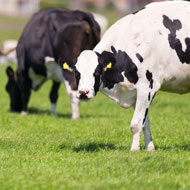New insights on how FMDV replicates

The team are now looking at how mutations in polyproteins could be used for producing attenuated vaccines.
Fresh insights on the replication processes of foot-and-mouth disease virus (FMDV) could pave the way for more effective vaccines, scientists say.
New findings published in PLOS Pathogens describe a tiny protein called 3B3, which is known to play a major role in the replication of FMDV. However, it also helps to increase the efficiency with which it can pack information into the genome, according to the Pirbright Institute and the University of Leeds.
FMD has a small amount of genetic material, so it has found ways to multiply its functions. During replication, the virus creates a string of proteins called polyproteins which are then cut up into their individual proteins. The research team discovered that 3B3 is key to directing the processing of the P3 polyprotein into its constituent parts.
Such methods are also used by other members of the picornavirus family, such as poliovirus, as well as non-picornaviruses.
Scientists say that systems such as these could be exploited to develop attenuated vaccines. The team are now looking at how mutations in polyproteins could be used for producing such vaccines.



 The Animal and Plant Health Agency (APHA) has updated its online reporting service for dead wild birds.
The Animal and Plant Health Agency (APHA) has updated its online reporting service for dead wild birds.